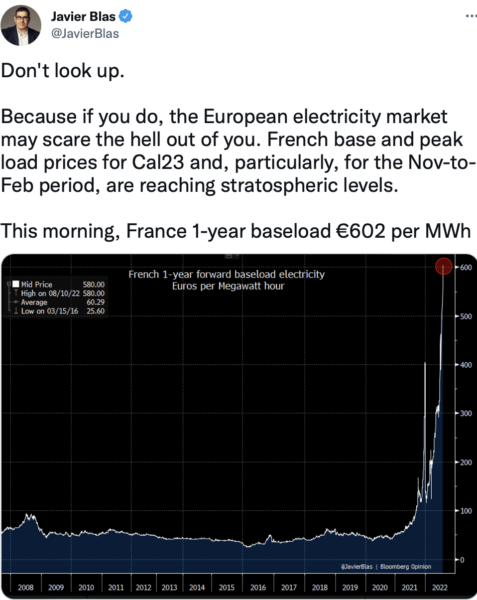When I made a government-sponsored junket to Germany in 2008 to tour their ambitious energy and environmental plans, every expert and government official our delegation met said the same thing: to have any chance of making Germany’s ambitious carbon-emissions reduction targets, they’d have to keep their nuclear power plants, despite the determination of the previous Social Democrats to phase them out. It seemed possible that Angela Merkel’s Christian Democrat-led coalition government might try to reverse this improvident policy.
Then Fukushima happened in 2011, and even though none of Germany’s nuclear plants was vulnerable to a tsunami, the Merkel government panicked and decided to accede to the demands of its Green Party coalition partner to close down all of its nuclear power plants after all.
It was only a matter of time before reality caught up with Germany even without the Ukraine War disrupting its Russian natural gas supply, and in fact Germany’s decarbonization stalled out about four years ago as the limits of wind and solar power were approached (just as it is in California today).
Today Germany acknowledged this reality:
Germany to Keep Last Three Nuclear-Power Plants Running in Policy U-Turn
BERLIN—Germany plans to postpone the closure of the country’s last three nuclear power plants as it braces for a possible shortage of energy this winter after Russia throttled gas supplies to the country, said German government officials.
While temporary, the move would mark the first departure from a policy initiated in the early 2000s to phase out nuclear energy in Germany and which had over time become enshrined in political consensus.
Maybe German electricity prices have something to do with it:
And speaking of German worries about a cold winter. . .
Chaser:
California governor proposes extending nuclear plant’s life
LOS ANGELES (AP) — California Gov. Gavin Newsom on Friday proposed extending the life of the state’s last operating nuclear power plant by five to 10 years to maintain reliable power supplies in the climate change era.
P.S. France isn’t looking much better, despite its ample nuclear fleet. The story here is the cascading effect of European energy interdependence:



Notice: All comments are subject to moderation. Our comments are intended to be a forum for civil discourse bearing on the subject under discussion. Commenters who stray beyond the bounds of civility or employ what we deem gratuitous vulgarity in a comment — including, but not limited to, “s***,” “f***,” “a*******,” or one of their many variants — will be banned without further notice in the sole discretion of the site moderator.